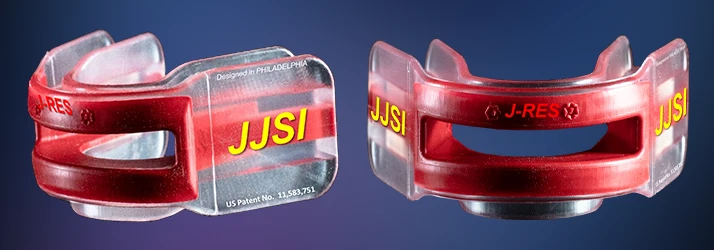J-RES™ (Jaw-Repositioning Engagement System) in Philadelphia PA

Dr. Edward Williams argues that many sports concussions, traumatic brain injuries (TBIs), and persistent post-concussion symptoms in Philadelphia PA are not fully explained by current models of head impact. The temporomandibular joint (TMJ) — the lower jaw joint — and associated anatomy as a pathway by which impact forces reach and damage parts of the brain, especially the temporal lobes.
Current safety equipment, diagnostic practices, and treatment protocols overlook this mechanism, which is why Jaw Joint Science Institute has introduced a corrective device (called J-RES™) as part of a solution.
A New View on Concussions and Brain Injury in Sports in Philadelphia PA
The temporomandibular joint (TMJ) is formed by the condyles of the lower jaw, which articulate within the glenoid fossa of the skull—a structure that is extremely thin, sometimes “eggshell thick.” Just beyond this fragile bone lie the temporal lobes of the brain, making the area particularly vulnerable. When the jaw experiences a direct blow or when the head is constrained, such as by a helmet chinstrap, the mandible can function as a lever, transmitting force through the condyles into the base of the skull. This mechanism can fracture the glenoid fossa, damage the adjacent temporal lobes, and trigger concussion or traumatic brain injury (TBI) symptoms. The risk is heightened by helmet chinstrap constraint (HCC), which forces the lower jaw upward during impact, intensifying stress on the TMJ and nearby brain structures. According to the Jaw Joint Science Institute, current helmet designs and test headforms fail to account for this pathway of injury, leaving athletes and others more susceptible to TMJ trauma and concussive brain damage.
Diagnosis and Healing in Philadelphia PA
Many concussions may involve “silent” or undetected fractures of the temporomandibular joint (TMJ) in the glenoid fossa. These overlooked injuries can play a significant role in persistent post-concussion problems, contributing to recurring headaches, cognitive difficulties, and other chronic symptoms. Case studies presented by the Institute show that with proper diagnosis and treatment, healing of these TMJ fractures over the course of several months has led to marked improvement, and in some cases complete resolution, of recurring concussion-related symptoms, underscoring the TMJ’s potential importance in both the origin and recovery of brain injury conditions.
Sports-Specific Impact Examples:
- Football: Repetitive helmet impacts, chinstrap force, linemen collisions.
- Soccer: Heading, falls, ball impacts.
- Basketball: Impacts above/below the rim, collisions, falls.
- Baseball, Rugby, Boxing: Impacts from balls, fists, collisions.
- Auto Collisions: Airbag deployment, whiplash, etc., also cause TMJ involvement.
Proposed Solution: J-RES™ (Jaw Restorer)
Standard mouthguards may inadvertently worsen risk, because the lower jaw may slide on the mouthguard, allowing the condyle to “slam” into the skull base (glenoid fossa) during impact. In effect, a mouthguard may protect teeth but may not protect (or may even increase stress on) the TMJ/brain path of injury.
This is where the Jaw Joint Science Institute's patented technology comes into play. The J-RES™ as an intraoral appliance that positions the upper and lower teeth in a way that “disengages” the jaw’s condyle from the glenoid fossa, effectively moving it out of a high-risk contact zone. By doing so, the device aims to block or reduce the transmission of force through the temporomandibular joint (TMJ) to the base of the brain.
Designed for use with or without helmets, the appliance can reportedly be fitted in just a few minutes and is intended to lessen chinstrap constraint while still allowing normal breathing, clenching, and comfort. Beyond concussion and TMJ protection, the Institute claims that J-RES™ may also enhance performance by improving strength and endurance, reducing fatigue, aiding physical therapy outcomes, and even alleviating issues such as snoring.
Implications for Safety, Diagnosis, and Treatment
Current helmet and safety gear test models are inadequate because they fail to include realistic jaw anatomy or temporomandibular joint (TMJ) modeling, leaving important injury pathways unaccounted for in safety standards. To address this gap, the Institute recommends that concussion and traumatic brain injury (TBI) diagnostic protocols incorporate imaging and evaluation of the TMJ, including potential fractures of the glenoid fossa, particularly when symptoms persist. In terms of treatment, the Institute suggests that integrating TMJ-based devices such as the J-RES™ with physical therapy could not only accelerate recovery but also help reduce long-term or chronic post-concussion symptoms.
Get Help from Jaw Joint Science Institute with J-RES™
The temporomandibular joint (TMJ), particularly the jaw’s condyles and the glenoid fossa, may represent a critical yet often overlooked pathway through which impact forces reach and damage the brain, especially in regions near the temporal lobes. Helmet chinstrap design and constraint can further amplify this risk by driving the lower jaw upward into the skull during impact. Standard concussion diagnosis and treatment protocols frequently overlook TMJ damage, which may help explain recurring or persistent post-concussion symptoms in some patients. As a proposed solution, the J-RES™ device aims to physically redirect or block harmful forces transmitted through the TMJ, though more rigorous scientific validation is still needed. To improve athlete safety, experts suggest that equipment design standards evolve to account for jaw mechanics, diagnostic imaging include TMJ evaluation, and devices like J-RES™ undergo larger, controlled studies to confirm their effectiveness.
OFFICE HOURS
Monday
9:30am - 4:00pm
Tuesday
9:30am - 4:00pm
Wednesday
9:30am - 4:00pm
Thursday
9:30am - 4:00pm
Friday
9:30am - 12:00pm
Saturday & Sunday
Closed
Jaw Joint Science Institute™
7700 Crittenden St
Philadelphia, PA 19118
(Located in Market Square at Chestnut Hill)
F: (215) 242-4212


